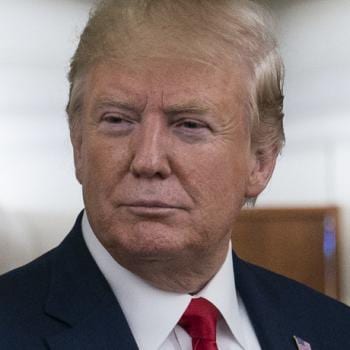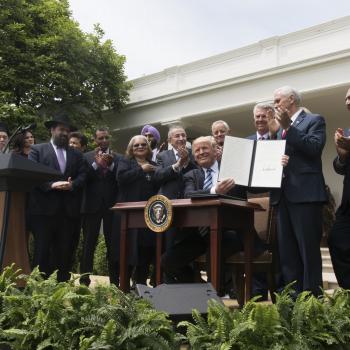by Robert Kubinec
The choice for evangelicals this election cycle appears to be between their moral ideals and the dirty necessity of voting for the least-worst candidate. Ted Cruz, in his (in)famous speech at the GOP national convention, hammered this point home when he asked Republicans to vote for whichever candidate their conscience approves of rather than for the official nominee, Donald Trump. However, despite Cruz’s advice, national polling shows many evangelicals back Trump to prevent a victory for Hillary Clinton. Yet this distinction between conscience and election strategy is unfounded. Voting for Trump against Hillary—simply because she is a Clinton—may well be a short-sighted reaction instead of a carefully considered tactical choice.
The theory of strategic voting has a long history in political science, dating back to the observation that American politics inevitably produces two large parties. Americans don’t want to waste their votes on a candidate who can’t win. As a result, we have developed a political philosophy of the “lesser of two evils”, a phrase far more popular in Facebook conversations since the rise of Trump and Clinton. But the idea of strategic voting relies on an assumption few people take into account. Voting for the lesser of two evils only matters if this election is the only election to consider.
As Republicans have learned so painfully in this election cycle, parties are organizations which can be more or less responsive to the social groups they represent. The two main parties are formed of loose coalitions of voters that converge on a central platform. During national elections, some of these intra-party coalitions win and some lose in the selection of a candidate. For this election, it is clear that the liberal wing of the Democratic party and the socially conservative wing of the Republican party have both lost, and there is no way for them to reverse the nomination process.
This failure is particularly galling for Christian voters who consider overturning abortion as the defining social issue of our time. A brief recap of the past three elections shows an abysmal trend: while in 2000 and 2004 the staunchly pro-life George Bush carried the cause forward, the GOP has nominated candidates in 2008 (McCain), 2012 (Romney) and 2016 (Trump) whose loyalty to the pro-life cause came about as a grudging concession to social conservatives in order to win the nomination. There should be no fanciful illusions that Trump’s brief lip-service to pro-life advocates amounts to any serious commitment to policy, and his icy relationship with his pro-life vice president is also troubling for the movement. Even many evangelical voters do not consider pro-life policies to be a top priority for this race. In a stunning turn of events, it is not clear which ticket is more pro-choice: Trump and Clinton are both on record as supporting abortion rights, while Clinton’s vice president is a Catholic who has supported restrictions on abortion.
The problem with voting for Trump as a way to stop Clinton is that choosing the lesser evil may only cement this growing marginalization of the pro-life movement from Republican politics. To my great surprise, when pro-life candidates were progressively eliminated this spring from the nomination cycle, pro-life groups did not stage any strong protest. Instead, evangelical leaders have more or less coalesced around Trump, convinced that God may do evil that good may result. However, voting for Trump strategically in this election may be a naïve move for social conservatives who want to sustain their coalition for future elections. The pro-life movement will not be successful in a day, even November 6th; rather, change will only come about when the movement has transformed cultures and policies to the point that support for abortion is unthinkable. That project is the great example of the evangelical William Wilberforce, the heroic British reformer who fought slavery for decades.
To finally admit that neither conscience nor strategy demands a vote for the Republican party is to open up an unsettling arena which few evangelicals want to consider. I believe that God may be calling pro-life voters to a period of political wilderness. In strategic terms, the pro-life movement needs to increase its bargaining power compared to the national political parties so that it can ensure the pro-life agenda remains front and center. It is, of course, possible that a vote for Donald Trump is still the best option given the concerns I have raised. But the alternatives must be considered this time around.
The most obvious option is for evangelical voters who have long voted Republican to switch sides and vote for Clinton. While her name is personally repugnant to some, the net effect on pro-life policies for choosing Clinton over Trump may in fact be minimal. Another option is to consider a third-party candidate, of which the Libertarian Gary Johnson is the most well-known. In terms of abortion policy, he is pro-choice, but practically he could bring about a tremendous decrease in abortions because he opposes the federal government’s ability to decide abortion policy for the states. Considering the strong pro-life support in many state legislatures, decentralizing abortion policy would outlaw the practice in much of our country. Yet Johnson also has some views many evangelicals will find peculiar, if not disturbing, such as the fact that he until recently ran his own recreational marijuana company.
In the end, even given this list of unpalatable alternatives, it is still important for Christians to vote in November. As those responsible for maintaining God’s creation, we cannot abdicate our responsibility to manage our government. If no candidate appears acceptable, I advise my friends and family to write in a candidate they admire. Write-in candidates have won elections before, and more importantly, voting sends a clear message to parties of what our priorities are. It may be too late to secure a pro-life candidate this election cycle, but that does not mean that evangelical voters must succumb to either a lesser evil or a blissful ignorance.
 Robert Kubinec is a PhD candidate at the University of Virginia in political science, currently undertaking field research about business politics in the Middle East. Previously, he was a Foreign Service Officer for the U.S. Department of State. He is a member of Trinity Presbyterian Church in Charlottesville, Virginia.
Robert Kubinec is a PhD candidate at the University of Virginia in political science, currently undertaking field research about business politics in the Middle East. Previously, he was a Foreign Service Officer for the U.S. Department of State. He is a member of Trinity Presbyterian Church in Charlottesville, Virginia.














